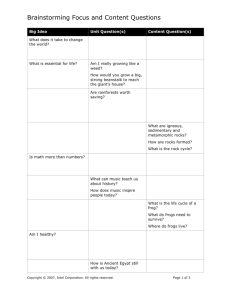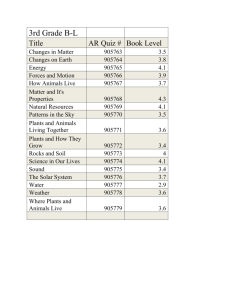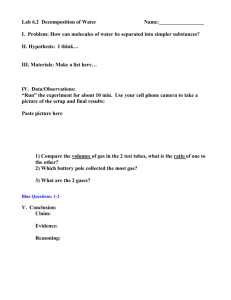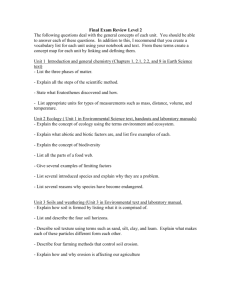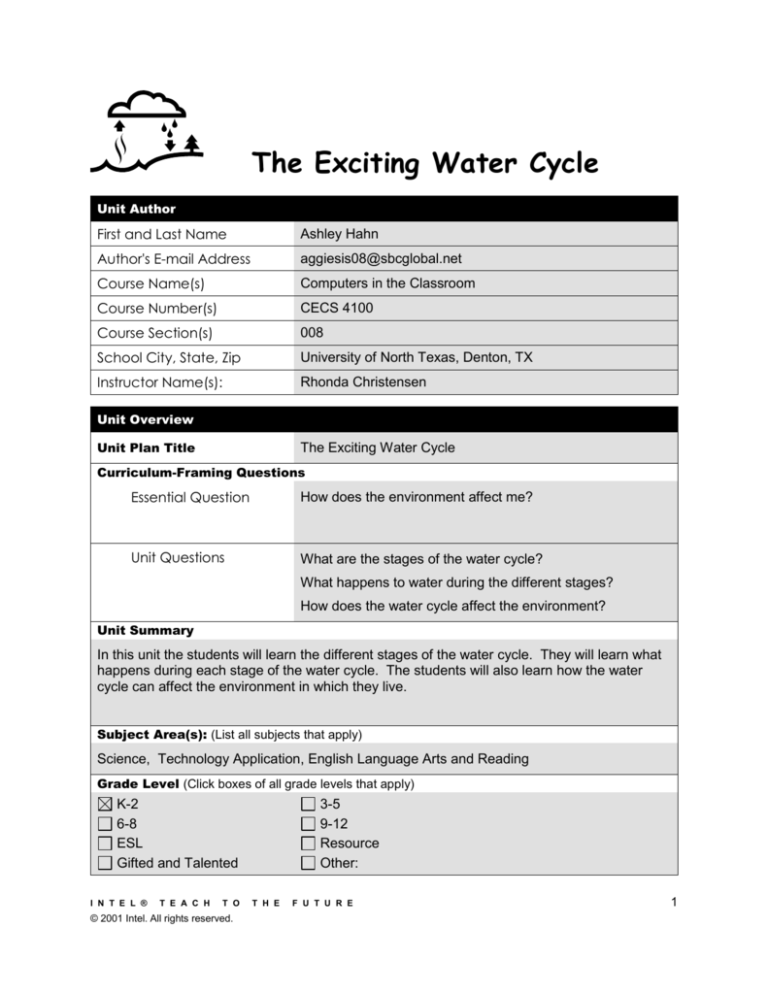
The Exciting Water Cycle
Unit Author
First and Last Name
Ashley Hahn
Author's E-mail Address
aggiesis08@sbcglobal.net
Course Name(s)
Computers in the Classroom
Course Number(s)
CECS 4100
Course Section(s)
008
School City, State, Zip
University of North Texas, Denton, TX
Instructor Name(s):
Rhonda Christensen
Unit Overview
Unit Plan Title
The Exciting Water Cycle
Curriculum-Framing Questions
Essential Question
How does the environment affect me?
Unit Questions
What are the stages of the water cycle?
What happens to water during the different stages?
How does the water cycle affect the environment?
Unit Summary
In this unit the students will learn the different stages of the water cycle. They will learn what
happens during each stage of the water cycle. The students will also learn how the water
cycle can affect the environment in which they live.
Subject Area(s): (List all subjects that apply)
Science, Technology Application, English Language Arts and Reading
Grade Level (Click boxes of all grade levels that apply)
K-2
6-8
ESL
Gifted and Talented
I N T E L ®
T E A C H
T O
© 2001 Intel. All rights reserved.
3-5
9-12
Resource
Other:
T H E
F U T U R E
1
UQ
#
Student
Objective/Learning
Outcome
Targeted State
Standard/Benchmark
Procedures/Activities
1
The Students will be able to name
the water cycle in order when
writing it down on a piece of
paper, with 100 percent accuracy.
Science Grade 2
10. Science concepts. The
student knows that the
natural world includes
rocks, soil, water, and gases
of the atmosphere. The
student is expected to :
a) describe and illustrate the
water cycle
b) identify used of natural
resources.
Technology Application
Grade 2
7. Solving problems. The
student uses appropriate
computer-based
productivity tools to
create and modify
solutions to problems.
The student is expected
to:
a) use software programs
with audio, video, and
graphics to enhance learning
experiences
Have the students make a
brochure on the water cycle.
Use the Science Court: Water
Cycle software.
2
The students will be able to write
down what happens during each
stage of the water cycle, with 80
percent accuracy. Create a
simulation of the water cycle.
Science Grade 2
10. Science concepts. The
student knows that the
natural world includes
rocks, soil, water, and gases
of the atmosphere. The
student is expected to :
a)describe and illustrate the
water cycle
Watch a video on how the
water cycle works and make a
water cycle in a jar. Do the
water cycle readers theater.
I N T E L ®
T E A C H
T O
© 2001 Intel. All rights reserved.
T H E
F U T U R E
2
b)identify used of natural
resources.
English Language Arts and
Reading
Grade 2
8. Reading/vocabulary
development. The
student develops an
extensive vocabulary.
The student is expected
to:
c) develop vocabulary
through reading
3
Students will be able to tell how
the water cycle affects the
environment in which they live,
with 75 percent accuracy.
I N T E L ®
T E A C H
T O
© 2001 Intel. All rights reserved.
T H E
Science Grade 2
10. Science concepts. The
student knows that the natural
world includes rocks, soil,
water, and gases of the
atmosphere. The student is
expected to :
a)describe and illustrate the
water cycle
b)identify used of natural
resources.
Technology Application
Grade 2
4. Information acquisition.
The student uses a variety of
strategies to acquire
information form electronic
resources, with appropriate
supervision. The student is
expected to:
a) apply keyword searches to
acquire information; and
b) select appropriate
strategies to navigate and
access information for
research and resource
sharing.
8. Solving problems. The
student uses research skills
and electronic
communication, with
appropriate supervision, to
F U T U R E
Have the students go to the
computer and search for ways
that the water cycle affects the
environment in which they
live.
Make a poster on how the
water cycle affects the
environment in which they
live.
3
create new knowledge. The
student is expected to:
a) use communication tools to
participate in group projects;
and
b) use electronic tools and
research skills to build a
knowledge base regarding a
topic, task, or assignment.
I N T E L ®
T E A C H
T O
© 2001 Intel. All rights reserved.
T H E
F U T U R E
4
Approximate Time Needed (Example: 45 minutes, 4 hours, 1 year, etc.)
2 weeks for one class period each day of 30-45 minutes.
Prerequisite Skills
Must be able to use a computer in order to search for different things on the internet.
Materials and Resources Required For Unit
Technology – Hardware (Click boxes of all equipment needed.)
Camera
Laser Disk
Computer(s)
Printer
Digital Camera
Projection System
DVD Player
Scanner
Internet Connection
Television
VCR
Video Camera
Video Conferencing Equip.
Other:
Technology – Software (Click boxes of all software needed.)
Database/Spreadsheet
Image Processing
Desktop Publishing
Internet Web Browser
E-mail Software
Multimedia
Encyclopedia on CD-ROM
Web Page Development
Word Processing
Other:
Printed Materials
Water Cycle readers theater
Supplies
Computer, Science Court: Water Cycle Software, Water
Cycle video, poster board, glue, paper, jars, plants, bottle
caps, water, soil, sand, small rocks
I N T E L ®
T E A C H
T O
© 2001 Intel. All rights reserved.
T H E
F U T U R E
5
Drinking Water & Ground Water Kids’ Stuff
http://www.epa.gov/OGWDW/kids/grades_k3_watercycle_activity.html
This is a great website for teachers and students. There
are a lot of activities for the students to do, as well as
activities that the teacher can do with the class.
Teachers.Net
http://www.teachers.net/lessons/posts/400.html
This is a great website for teachers. There are a lot of
different lesson plans you can use. For this unit plan I
am using the reader’s theater activity that relates to the
water cycle.
Kidszone
http://www.kidzone.us/water/
Internet Resources
This website is great because it has activities for the
students to do. They will also enjoy all the pictures that
are on the website.
Lenntech
http://www.lenntech.com/water-pollutionFAQ.htm?gclid=CJmz5-nvyIQCFR78SAoduFkfKQ
This website is a great resource when trying to help your
students find out how the water cycle can affect the
environment. It talks a lot about water pollution and also
talks about acid rain.
Center for Research on Environment and Water
http://crew.iges.org/
This website is a great resource for learning about how
the water cycle affects the environment.
Accommodations for Differentiated Instruction
Resource Student
Give the student different web sites where they can find the
information that they need.
Gifted Student
The gifted students can use micro worlds to illustrate the
water cycle.
Student Assessment
Use a rubric in order to assess the students work.
Students will be grades on their ability to recognize the different stages of the water cycle, tell
what happens during the different stages of the water cycle, and being able to tell how the
water cycle affects the environment in which they live.
Page 6 of 6

